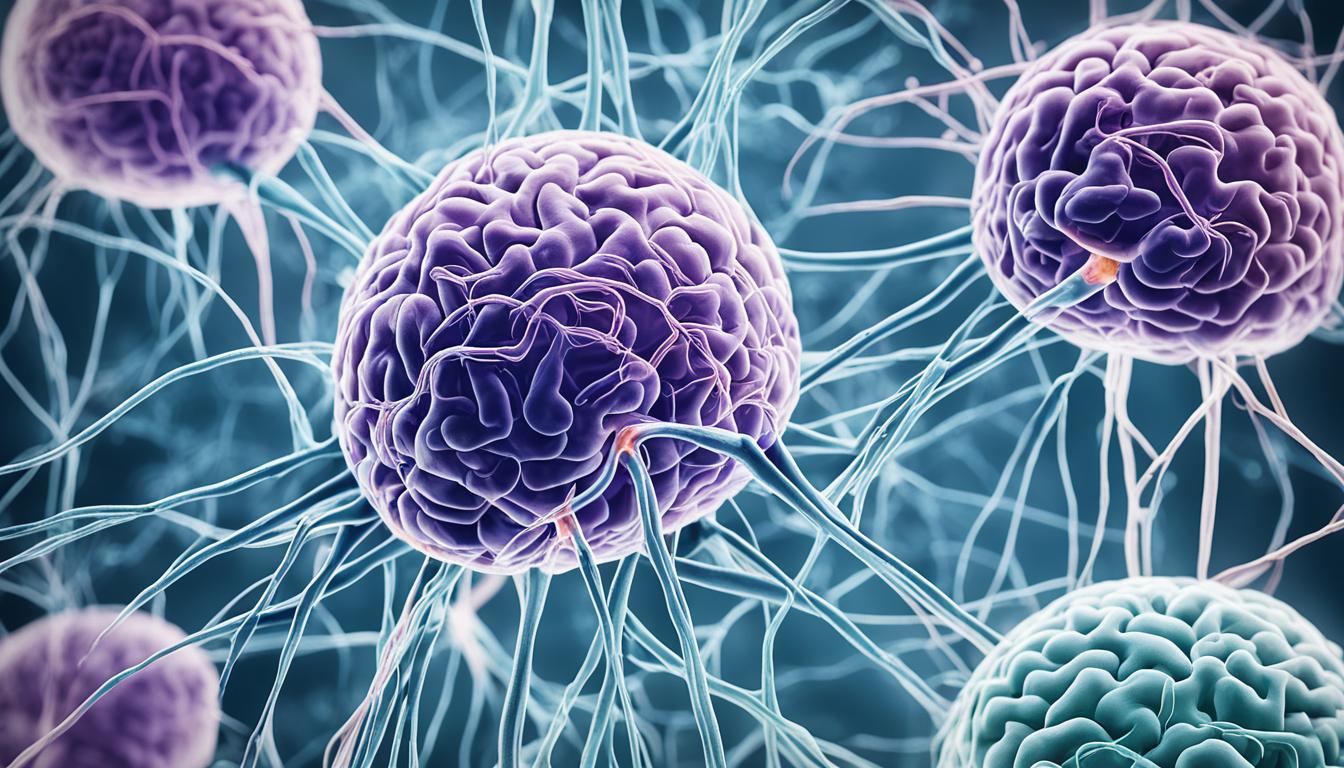Welcome to our article on the vital role of magnesium in prostate health. Recent studies have surfaced a potential link between magnesium levels and prostate health, suggesting that keeping magnesium levels adequate may help reduce inflammation and support prostate function. In this article, we will delve into the benefits of magnesium for prostate health and discuss natural remedies and dietary sources to optimize magnesium intake.
Key Takeaways:
- Maintaining adequate magnesium levels may support prostate health.
- Low magnesium levels have been associated with an increased risk of prostate inflammation and enlargement.
- Magnesium has anti-inflammatory properties that may help reduce prostate inflammation and alleviate related symptoms.
- Magnesium can help relax smooth muscles in the prostate, potentially improving urinary flow and reducing symptoms associated with prostate enlargement.
- Including magnesium-rich foods in your diet and considering magnesium supplements can help support optimal prostate function.
The Importance of Magnesium for Prostate Health
Maintaining optimal prostate health is crucial for overall well-being. One essential mineral that plays a significant role in supporting prostate function is magnesium. This vital nutrient is involved in various bodily processes, including the health of the prostate gland.
Magnesium is essential for maintaining normal prostate size and function. It helps regulate the growth and proliferation of prostate cells, ensuring the gland remains in balance. Adequate levels of magnesium are necessary to support the health and integrity of the prostate.
Low levels of magnesium have been associated with an increased risk of prostate issues, such as inflammation and enlargement. Prostate inflammation, or prostatitis, can cause discomfort and affect urinary function. Research has shown a potential link between magnesium deficiency and an elevated risk of high-grade prostate cancer.
It is crucial to prioritize adequate magnesium intake to support overall prostate health and reduce the risk of prostate-related complications.
Benefits of Magnesium for Prostate Health:
- Supports prostate function and maintains normal prostate size
- Reduces the risk of prostate inflammation
- Minimizes the likelihood of prostate enlargement
- May lower the risk of high-grade prostate cancer
By ensuring sufficient magnesium levels, individuals can take proactive steps in safeguarding their prostate health.
Dietary Sources of Magnesium
Incorporating magnesium-rich foods into your diet is an excellent way to support prostate health. These include:
| Food Sources | Magnesium Content (per 100g) |
|---|---|
| Spinach | 79mg |
| Almonds | 270mg |
| Pumpkin seeds | 550mg |
| Quinoa | 64mg |
| Salmon | 30mg |
Adding these magnesium-rich foods to your daily meals can provide a natural source of this essential mineral.
Pro Tip: Aim to consume a balanced diet that includes a variety of magnesium-rich foods to ensure adequate intake for optimal prostate health.
In addition to dietary sources, magnesium supplements can be beneficial for individuals who may have difficulty obtaining sufficient magnesium from their diet alone. However, it is essential to consult with a healthcare professional before starting any new supplement regimen to determine the appropriate dosage for your specific needs.
By recognizing the importance of magnesium and taking proactive steps to maintain optimal levels, we can support the health and function of our prostate, contributing to our overall well-being.
Magnesium and Prostate Inflammation
Prostate inflammation, also known as prostatitis, can cause pain and discomfort for many individuals. Research suggests that magnesium, a vital mineral, may help reduce inflammation in the prostate gland, thereby alleviating symptoms and promoting overall prostate health.
Studies have shown that magnesium possesses anti-inflammatory properties, which can help lower levels of inflammation in the prostate. By reducing inflammation, magnesium may contribute to the prevention or management of prostate issues, including prostatitis.
Increasing magnesium intake through supplementation or consuming magnesium-rich foods can be a natural and effective way to address prostate inflammation. To incorporate more magnesium into your diet, you can include foods such as:
- Leafy greens
- Nuts and seeds
- Whole grains
- Legumes
- Seafood
These magnesium-rich foods not only contribute to prostate health but also offer a plethora of other nutritional benefits.
Magnesium’s anti-inflammatory properties may help reduce prostate inflammation, promoting better prostate health and overall well-being.
Studies on Magnesium and Prostate Inflammation
Several studies have investigated the connection between magnesium and prostate inflammation. For example, a study published in the Journal of Biological Inorganic Chemistry found that magnesium supplementation reduced inflammation and oxidative stress markers in the prostates of laboratory animals.
Another study conducted at a urological hospital evaluated the effect of magnesium treatment on patients with chronic prostatitis. The results showed significant improvements in pain scores and quality of life after magnesium therapy.
Magnesium and Prostate Enlargement
Prostate enlargement, also known as benign prostatic hyperplasia (BPH), is a common condition that affects many men as they age. It is characterized by the enlargement of the prostate gland, which can lead to urinary symptoms and discomfort. Research has shown that magnesium may have a preventive effect on prostate enlargement, making it an important element in maintaining prostate health.
One of the ways magnesium contributes to prostate health is by helping to relax the smooth muscles in the prostate gland. This relaxation can improve urinary flow and alleviate symptoms associated with BPH, such as frequent urination, weak urine flow, and the constant need to urinate at night. By maintaining adequate levels of magnesium, we can help support a healthy prostate size and reduce the risk of developing BPH.
To highlight the benefits of magnesium for prostate health, let’s take a look at the following table:
| Magnesium | Prostate Enlargement |
|---|---|
| Helps relax smooth muscles in the prostate gland | Prevents prostate enlargement |
| Improves urinary flow | Reduces symptoms associated with BPH |
| Maintains a healthy prostate size | Reduces the risk of developing BPH |
As you can see from the table, magnesium’s relaxation effect on the smooth muscles of the prostate gland contributes to the prevention of prostate enlargement. It also helps improve urinary flow and reduce BPH symptoms. By ensuring adequate magnesium levels in our bodies, we can support a healthy prostate and reduce the risk of developing BPH.
Dietary Sources of Magnesium for Prostate Health
When it comes to supporting prostate health, consuming a balanced diet rich in magnesium is essential. Magnesium is a vital mineral that plays a crucial role in various bodily functions, including prostate function. Including magnesium-rich foods in your diet can help maintain optimal levels of this essential mineral, promoting prostate health.
So, what are some magnesium-rich foods that you can incorporate into your daily meals? Here are some top contenders:
- Leafy greens: Spinach, kale, and Swiss chard are excellent sources of magnesium. Add them to your salads, soups, or stir-fries for a nutritious boost.
- Nuts and seeds: Almonds, cashews, pumpkin seeds, and sunflower seeds are not only tasty but also packed with magnesium. Snack on them or sprinkle them over your yogurt or oatmeal.
- Whole grains: Foods like quinoa, brown rice, and whole wheat bread are not only rich in fiber but also contain magnesium. Incorporate them into your meals as a healthy carbohydrate option.
- Legumes: Beans, lentils, and chickpeas are not only a great source of plant-based protein but also rich in magnesium. Include them in your stews, salads, or as a side dish.
- Seafood: Fish like salmon, mackerel, and halibut are not only delicious but also high in magnesium. Grill or bake them for a heart-healthy meal.
Incorporating these magnesium-rich foods into your diet regularly can contribute to overall prostate health by ensuring you maintain adequate levels of this essential mineral. Remember, a balanced diet is the key to a healthy prostate.

Magnesium-Rich Foods for Prostate Health
| Leafy greens | Nuts and seeds | Whole grains | Legumes | Seafood |
|---|---|---|---|---|
| Spinach | Almonds | Quinoa | Beans | Salmon |
| Kale | Cashews | Brown rice | Lentils | Mackerel |
| Swiss chard | Pumpkin seeds | Whole wheat bread | Chickpeas | Halibut |
Magnesium Supplements for Prostate Health
In addition to dietary sources, magnesium supplements can provide valuable support for prostate health. These supplements offer a concentrated dose of magnesium, making them especially beneficial for individuals who may struggle to obtain sufficient amounts from their diet alone. With the guidance of a healthcare professional, incorporating magnesium supplements into your routine can help ensure that you meet your body’s magnesium needs to maintain optimal prostate function.
By taking magnesium supplements, you can conveniently and effectively boost your magnesium intake, promoting prostate health and overall well-being. However, it is crucial to consult with a healthcare professional before starting any new supplement regimen. They can help determine the appropriate dosage for your specific health needs and ensure that the supplement is safe and compatible with your current medications or health conditions.
The Benefits of Magnesium Supplements for Prostate Health
Magnesium supplements offer several benefits for supporting prostate health:
- Reduced inflammation: Studies suggest that magnesium has anti-inflammatory properties, making it useful in reducing inflammation in the prostate gland. By incorporating magnesium supplements into your routine, you can potentially help alleviate symptoms of prostate inflammation such as pain and discomfort.
- Support for prostate function: Maintaining optimal levels of magnesium is crucial for supporting normal prostate function. By taking magnesium supplements, you can help support prostate health and contribute to the maintenance of a healthy prostate size.
- Reduced risk of prostate enlargement: Magnesium plays a role in relaxing smooth muscles in the prostate, which can help improve urinary flow and reduce the risk of prostate enlargement.
Remember, while magnesium supplements can offer valuable support, they should not replace a balanced diet rich in magnesium-rich foods. Supplements should be seen as a complement to a healthy lifestyle and dietary habits.
A Word of Caution
Although magnesium supplements are generally safe for most people, it is important to consult with a healthcare professional before starting any new supplement regimen. They can provide personalized advice based on your individual health profile and help you determine the appropriate dosage for your needs.
Additionally, magnesium supplements may interact with certain medications, such as antibiotics or diuretics, so it is crucial to inform your healthcare professional about all the medications you are currently taking to avoid any potential interactions or adverse effects.

By incorporating magnesium supplements as part of an overall prostate health support plan, you can harness the benefits of this essential mineral to promote a healthy prostate and overall well-being.
Conclusion
In conclusion, magnesium plays a vital role in supporting prostate health. Adequate levels of magnesium have been associated with a reduced risk of prostate issues, including inflammation and enlargement. Including magnesium-rich foods in your diet and considering magnesium supplements can help support optimal prostate function. However, it is always important to consult with a healthcare professional before making any significant changes to your diet or starting new supplements. By prioritizing magnesium intake, you can help promote prostate health and overall well-being.
FAQ
How does magnesium support prostate health?
Magnesium plays a crucial role in supporting prostate function and maintaining normal prostate size. It has been associated with reducing inflammation, supporting urinary flow, and reducing the risk of prostate enlargement.
Can magnesium reduce prostate inflammation?
Yes, studies have shown that magnesium has anti-inflammatory properties and may help reduce inflammation in the prostate gland. Increasing magnesium intake through supplementation or consuming magnesium-rich foods may help alleviate symptoms of prostate inflammation.
Does magnesium have a preventive effect on prostate enlargement?
Some studies have suggested that magnesium may have a preventive effect on prostate enlargement, also known as benign prostatic hyperplasia (BPH). Magnesium helps relax smooth muscles in the prostate, which can improve urinary flow and reduce symptoms associated with BPH.
What are some dietary sources of magnesium for prostate health?
Magnesium-rich foods include leafy greens, nuts and seeds, whole grains, legumes, and seafood. Including these foods regularly in your diet can help maintain optimal levels of magnesium and support overall prostate health.
Are magnesium supplements beneficial for prostate health?
Yes, magnesium supplements can be beneficial for individuals who may have difficulty obtaining sufficient magnesium from their diet alone. However, it is important to consult with a healthcare professional before starting any new supplement regimen to ensure the appropriate dosage and safety for your specific health needs.
How Does Iodine Compare to Magnesium for Prostate Health?
When considering iodine’s benefits for prostate health, it’s important to also weigh the role of magnesium. While iodine is essential for overall health, magnesium also plays a key part in prostate function. Both nutrients are important, and maintaining a balance of each can contribute to optimal prostate health.



